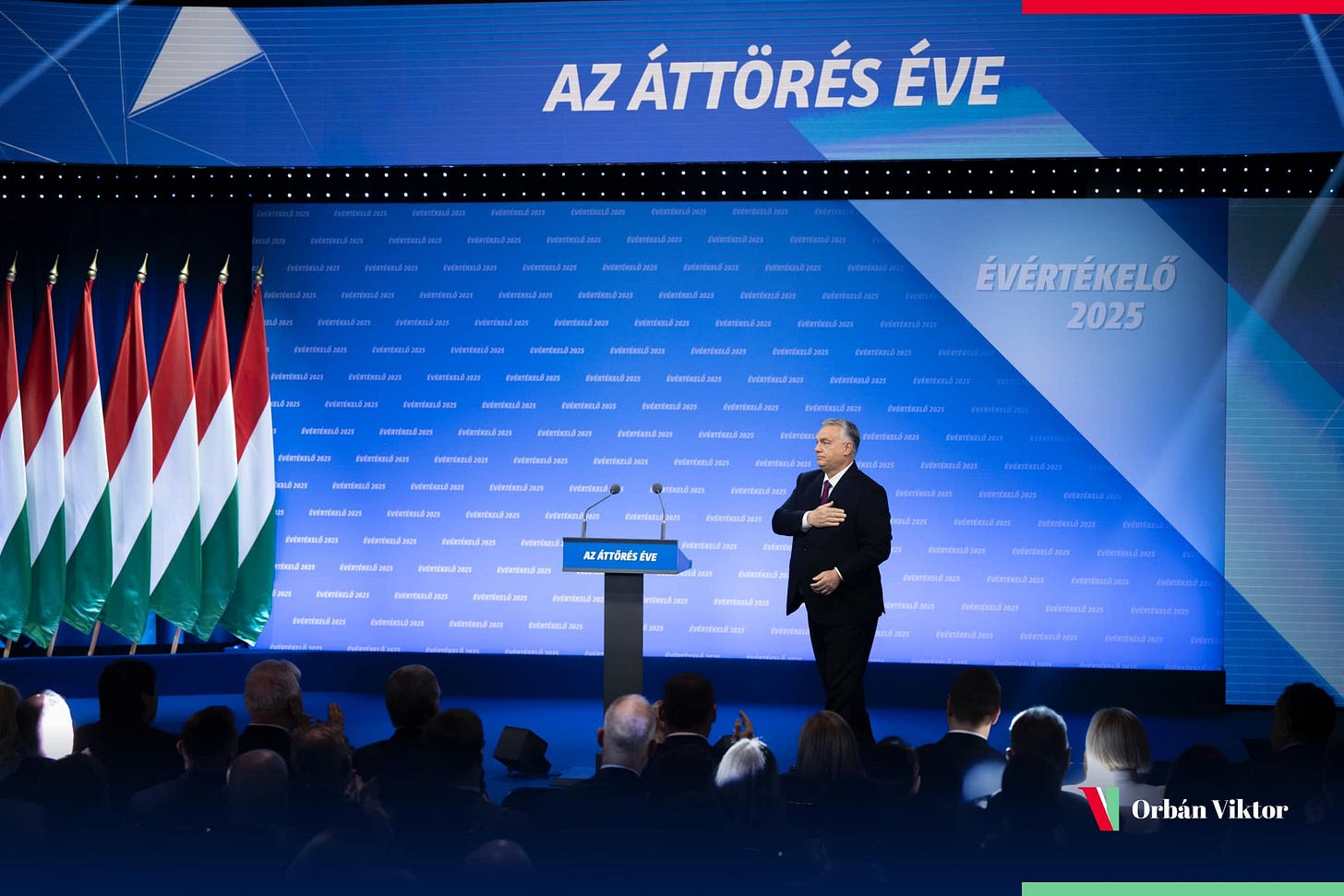Fidesz’s 2026 Campaign Begins: More Money, More Attacks, Same Playbook
Viktor Orbán jumpstarted his re-election campaign in an annual speech last week. His new tactic seems to be the same old – just more of it than ever before.

Viktor Orbán has officially kickstarted his 2026 electoral campaign, using his annual "Year in Review" speech to lay out his strategy. While these speeches are normally used to provide his evaluation of the state of the world and broad stroke Fidesz agenda and ideology, this year it felt more like a campaign speech. It revealed that his campaign formula remains the same as in previous years—state-funded pre-election handouts and an intensified culture war. But this time, both are being taken to new levels. To underscore the scale of his economic promises, Orbán declared that Hungary was becoming a "family tax haven", calling the new program "a world sensation that doesn’t exist anywhere else".
The economic measures announced were overwhelmingly focused on families, particularly mothers. In what is arguably the biggest pre-election giveaway in Fidesz history, Orbán promised a lifetime tax exemption for mothers with at least two or three children, introduced for mothers with three children in 2025 October, for those with two children step by step from 2026 January. He also promised to double the child tax benefit for families and make maternity leave payments tax exempt. The host of economic measures also included a consumption tax exemption for basic goods for retirees, and some less prominent economic stimulus measures.
Just as Soros-funded immigrants were the main threat in 2018 and Russia’s war on Ukraine in 2022 campaign, Fidesz has now decisively named the LGBTQ+ community as the primary threat to Hungary for 2026. Orbán promised a constitutional amendment stating that a person can only be legally recognized as a man or a woman. He also threatened to ban the annual Budapest pride parade, telling organizers not to bother this year as it will be a waste of time and money. (Since the speech, differing accounts from Fidesz have created some confusion over what this actually means). Nevertheless, these attacks also fit into Fidesz’s broader election cycle pattern—always defining an "existential threat" that can only be stopped by keeping Orbán in power.
Fidesz launched its campaign earlier than expected, in response to a now pressing need for him to regain control of the political agenda. For over a year, the party had been reacting to Péter Magyar and Tisza, rather than leading the news cycle. This is Fidesz’s first calculated, coordinated campaign move in a long time, and it successfully shifted attention back to Orbán. But what does it reveal?
First, this confirms what many have predicted: Fidesz will go to whatever length necessary to stay in power. A core principle of political science is that when electoral autocrats feel seriously threatened and have at least some minimal capacity to, they escalate both co-optation and repression. Péter Magyar himself has warned in his speeches for months that this election will be more unfair than ever before, with Fidesz using every tool at its disposal.
This unprecedented wave of financial benefits is part of that strategy. The primary goal is victory—consequences can be dealt with later. Promising lifetime tax exemptions sounds great now, but it’s a policy that can be quietly if necessary, once the acute electoral threat subsides. If Fidesz wins in 2026, Tisza runs out of steam, and the economy cannot sustain these promises, they can probably reverse course without fearing the same degree of electoral backlash.
Second, these measures are also a relatively coherent strategic attempt to restore Fidesz’s moral legitimacy. The child abuse pardon scandal of the past year damaged the credibility of Fidesz’s conservative, pro-family image. By doubling down on family-friendly policies and launching new attacks on the LGBTQ+ community, Orbán is trying to reassert Fidesz’s identity as Hungary’s defender of "family-focused Christian values."
Finally, the measures also target specific electoral groups that Fidesz seeks to retain or hopes to easily persuade. For one, the intensified anti-LGBTQ rhetoric is a clear attempt to woo Mi Hazánk supporters and retain and mobilize Fidesz’s core conservative base. This is coupled with the latest smear campaign – probably first of many – linking Péter Magyar to the “LGBTQ propaganda” through accusing Krisztina Bódis, Tisza’s family policy expert and founder of an important child protection NGO, of spreading LGBTQ propaganda. On the other hand, the handouts are primarily aimed at women, a group where Tisza has struggled to gain traction. Péter Magyar’s dynamic, masculine, confrontational style has resonated less with female voters, leaving an opening for Fidesz. However dissatisfied with Fidesz they might be, women seem more hesitant to defect to Tisza, suggesting that a little extra money and attention to them can go a long way.
For Tisza, the challenge is significant. Péter Magyar has already successfully fended off multiple smear campaigns, but financial handouts are much harder to counter from opposition. If there is anything we have learned from elections in Polish opposition to Law and Justice, it is that opposition counterarguments for fiscal prudence generally do not resonate with voters. Magyar would also have a hard time convincing voters that Orbán’s promises are unsustainable, given that Fidesz has built a 15-year track record of cash transfers, and voters trust them on this. Economic downturn or not, Fidesz still holds credibility as a “money distributor”.
Instead, Magyar should convince voters that they would give at least the same amount if not more, while also shifting the agenda to other issues where Fidesz can be attacked. If Tisza is unsuccessful at this, even voters fed up with Fidesz’s corruption, economic mismanagement, and other crises may ultimately decide they cannot risk a worse financial situation in the short-term and vote for Tisza.
Hanna Fölsz




